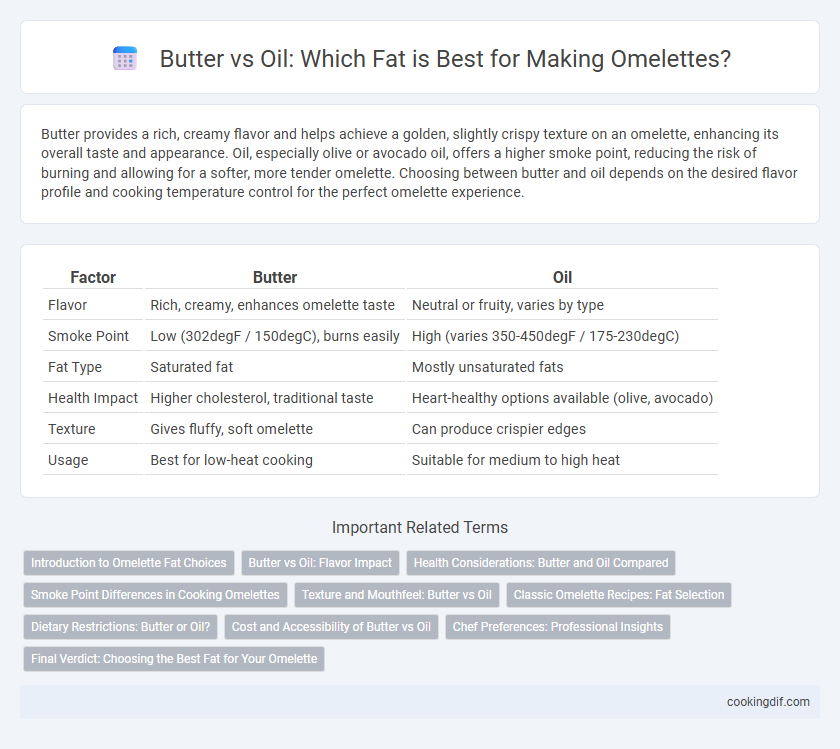Butter provides a rich, creamy flavor and helps achieve a golden, slightly crispy texture on an omelette, enhancing its overall taste and appearance. Oil, especially olive or avocado oil, offers a higher smoke point, reducing the risk of burning and allowing for a softer, more tender omelette. Choosing between butter and oil depends on the desired flavor profile and cooking temperature control for the perfect omelette experience.
Table of Comparison
| Factor | Butter | Oil |
|---|---|---|
| Flavor | Rich, creamy, enhances omelette taste | Neutral or fruity, varies by type |
| Smoke Point | Low (302degF / 150degC), burns easily | High (varies 350-450degF / 175-230degC) |
| Fat Type | Saturated fat | Mostly unsaturated fats |
| Health Impact | Higher cholesterol, traditional taste | Heart-healthy options available (olive, avocado) |
| Texture | Gives fluffy, soft omelette | Can produce crispier edges |
| Usage | Best for low-heat cooking | Suitable for medium to high heat |
Introduction to Omelette Fat Choices
Choosing the right fat is essential for achieving the perfect omelette texture and flavor. Butter provides a rich, creamy taste and promotes browning due to its milk solids while adding moisture to the eggs. In contrast, oil, such as olive or vegetable oil, offers a higher smoke point and a neutral flavor, making it suitable for cooking at higher temperatures without burning.
Butter vs Oil: Flavor Impact
Butter enhances omelette flavor with its rich, creamy, and slightly nutty taste due to milk solids that brown during cooking, creating a complex aroma. Oil, typically neutral like vegetable or canola, allows the omelette's eggs and fillings to dominate the flavor profile without added richness. Choosing butter over oil significantly elevates the sensory experience by adding depth and a subtle sweetness often associated with classic French-style omelettes.
Health Considerations: Butter and Oil Compared
Butter contains saturated fats that may raise LDL cholesterol levels, while oils such as olive or avocado provide healthier monounsaturated fats that support heart health. Choosing oils rich in polyunsaturated fats offers essential fatty acids and antioxidants, promoting better cardiovascular outcomes. Butter delivers a rich flavor but can increase calorie intake, making moderate use key for balanced nutrition in omelette preparation.
Smoke Point Differences in Cooking Omelettes
Butter has a lower smoke point around 302degF (150degC), which can cause it to brown or burn quickly when cooking omelettes, imparting a rich flavor but requiring careful temperature control. In contrast, oils like canola or vegetable oil have higher smoke points between 400-450degF (204-232degC), offering more heat tolerance and preventing burning during omelette cooking. Choosing butter enhances taste with its creamy texture, while oil provides stability under higher heat, influencing the texture and cooking precision of the omelette.
Texture and Mouthfeel: Butter vs Oil
Butter imparts a rich, creamy texture and a smooth mouthfeel to omelettes, enhancing their overall tenderness and flavor depth. Oil, particularly neutral oils like vegetable or canola, tends to produce a lighter, slightly crispier edge with a less pronounced buttery taste. Choosing butter over oil results in a more velvety and moist omelette, while oil offers a subtle crispness and lighter texture.
Classic Omelette Recipes: Fat Selection
Classic omelette recipes favor butter for its rich flavor and creamy texture, which enhances the eggs' natural taste. Butter's lower smoke point allows gentle cooking, preventing browning and maintaining a tender omelette. While oil offers a higher smoke point and a neutral flavor, butter remains the preferred fat in traditional French omelettes.
Dietary Restrictions: Butter or Oil?
Butter provides a rich flavor but contains dairy, making it unsuitable for individuals with lactose intolerance or dairy allergies. Vegetable or olive oil offers a dairy-free alternative, ideal for vegan diets and those with dietary restrictions related to animal fats. Choosing oil also reduces saturated fat intake, beneficial for heart health-conscious individuals.
Cost and Accessibility of Butter vs Oil
Butter generally costs more per tablespoon compared to common cooking oils such as vegetable or canola oil, impacting budget-conscious cooking. While butter offers rich flavor and creamy texture, its price and limited shelf life make oil a more accessible option for everyday use. Oils tend to have wider availability in most grocery stores and longer storage life, providing convenience and cost-effectiveness for omelette preparation.
Chef Preferences: Professional Insights
Chefs often prefer butter for omelettes due to its rich flavor and ability to create a golden, crispy texture, while some opt for oil to achieve a higher smoke point and cleaner taste. Butter's milk solids contribute to browning through the Maillard reaction, enhancing aroma and depth, whereas oils like olive or avocado provide healthier fat options with less risk of burning. The choice ultimately hinges on desired taste profiles and cooking techniques prevalent in professional kitchens.
Final Verdict: Choosing the Best Fat for Your Omelette
Butter offers a rich, creamy flavor and promotes a golden-brown crust, enhancing the omelette's texture and taste. Oil, particularly olive or avocado oil, provides a higher smoke point, ensuring even cooking without burning and contributing a subtle, neutral taste. For the best omelette, choose butter for flavor and texture, or opt for oil when prioritizing a healthier option and higher cooking temperature stability.
Butter vs Oil for omelette fat Infographic

 cookingdif.com
cookingdif.com